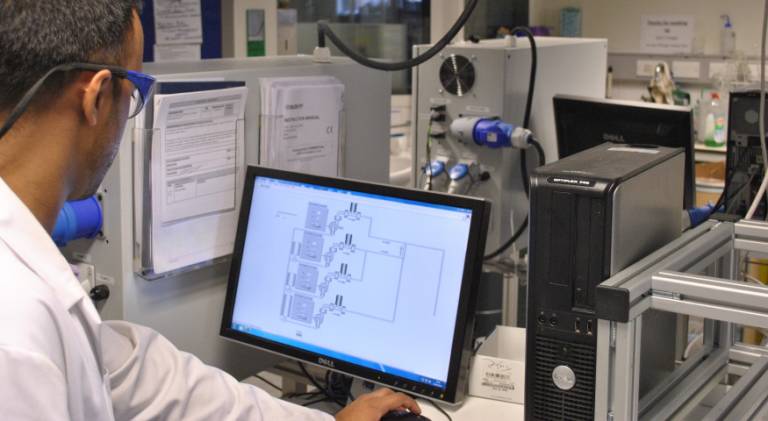Postgraduate Research
Content placeholder
PhD Chemistry

The Chemistry PhD programme is focused on a major piece of original research. You will study under the direct supervision of a member of staff, who is an expert in his or her area of specialisation. The department offers a broad range of research themes across physical, organic, inorganic and computational chemistry, specific departmental strengths are listed under research areas below.
Read more on the Chemistry PhD programme
- A 3-year PhD Industry funded studentship in “Synthesis and Discovery of Next generation Scintillator Metal Oxides” (annual stipend including London Weighting and a top up is £23,237) (D/L: 15/08/2024)
Supervisor: Prof Jawwad A. Darr
Application deadline: August 15th 2024
Interview date: interviews on a rolling basis
Start date: 23rd September 2024UCL Chemistry Department is offering a fully funded studentship (£23,237 pa) to a highly motivated candidate to start in September 2024. The fully funded student will carry out his/her doctoral research at UCL in materials chemistry for the synthesis and discovery of new metal oxide-based scintillator materials for imaging. The PhD studentship will focus on the synthesis (materials discovery) and development using more sustainable, scalable and reliable synthesis routes to such materials. Thus, the role would suit someone who is interested in lab research, inorganic materials synthesis, scale up and characterisation.
Background on the applications: New high light yield scintillator-based imaging detectors using both X-ray and neutrons, are important for enhanced resolution for non-destructive characterization. Such devices require the use of high flux radiation sources (e.g. X rays and Neutrons) that when combined with dense disks of specific materials, can be used in high end demanding imaging applications; from aerospace component imaging to thick hazardous metal container imaging applications. (https://www.osti.gov/biblio/1759981 Scintillators and Detectors for MeV X-ray and Neutron Imaging). The project seeks to develop new materials compositions that are suitable in this application space.
Main duties and responsibilities of the student include: to carry out experimental research to make and optimise lanthanide metal oxide materials libraries and undertake analytical characterisation to find the optimum materials for sintering and performance. The project will involve interactions with AWE and its partners. The materials evaluation research proposed in the PhD project, would lead to the development of improved materials with good stability, good sinterability, high optical transparency, short afterglow, and high sensitivity to X-rays and neutrons. To travel and visit collaborators as necessary. This fully funded research is co-funded via a UCL impact studentship along with industrial sponsor AWE that is seeking to develop the Uk’s expertise in such devicesThe applicants should have, or be expecting to achieve, a first or upper second-class Honours degree or equivalent in a relevant scientific or engineering discipline (e.g. materials, chemistry, chemical engineering, physics)
Interested candidates should initially contact the supervisor, Prof Jawwad A. Darr (j.a.darr@ucl.ac.uk), see his research group website on www.ucl.me.uk), with a CV and a cover letter expressing your interest in the project. Please note that a suitable applicant will be required to complete MS Form entitled Application for Research: degree Chemistry programme. In addition, it is essential that suitable applicants complete an electronic application form at https://www.ucl.ac.uk/prospective-students/graduate/research-degrees/chemistry-mphil-phd (please select Research degree: Chemistry programme) prior to the application deadline and advise their referees to submit their references as soon as they possibly can. All shortlisted applicants will be invited for an interview on a rolling basis until an appointment is made. The interview process will be clarified nearer the time. Any admissions queries should be directed to Dr Jadranka Butorac at doctoral.chem@ucl.ac.uk.
The updated rules for eligibility for home fees for next year are available at View Website.
 Close
Close

